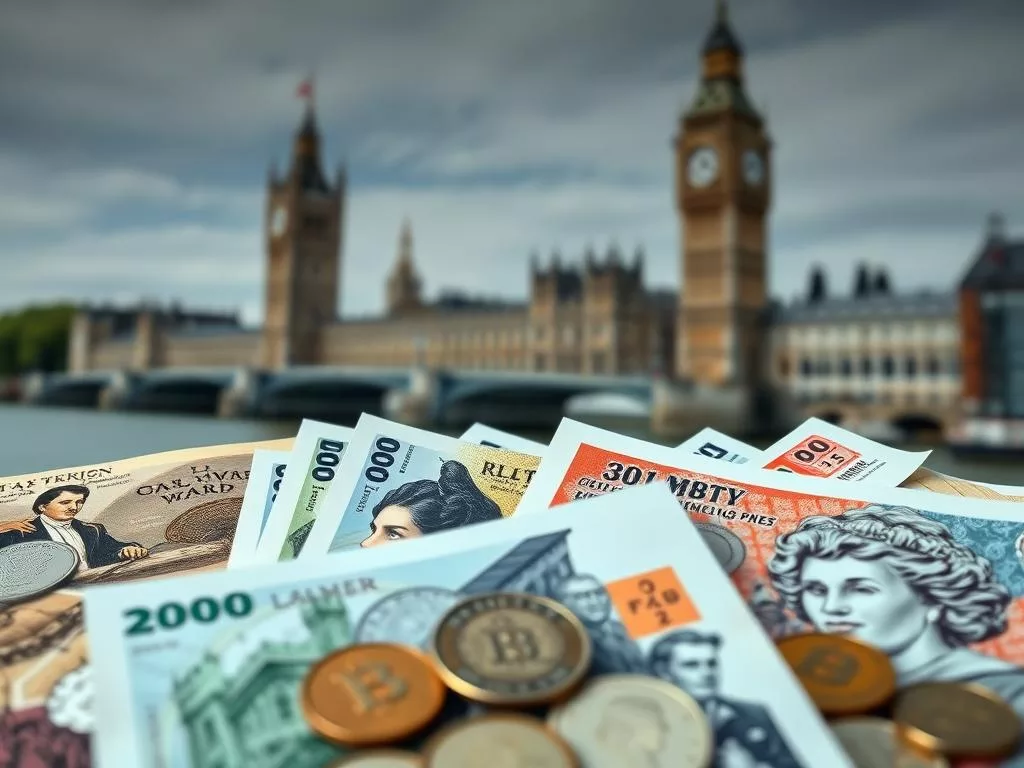Traveling with euros in the UK can be tricky. The UK uses Pound Sterling (£), not euros. Most places in the UK don’t accept euros, making it hard for travelers.
This guide will help you with UK currency tips. It tells you what to do with euros and how to exchange them efficiently.
It’s not wise to spend euros in the UK because of high exchange rates. Better to keep them for future trips or exchange at a currency bureau. If you use a Euro-denominated card, watch out for fees.
Choosing banks without conversion fees or using a travel debit card can help manage your money better in the UK.
Knowing about the UK’s currency is key for a smooth trip. With some planning, you can avoid losing money. For more tips, check out this guide on spending euros in the UK.
Understanding Currency in the UK
The UK mainly uses the Pound Sterling (£), divided into 100 pence. It has coins and bank notes in different values. Coins range from 1 to 50 pence, and bank notes are 5, 10, 20, and 50 pounds. With Queen Elizabeth II’s passing, new notes with King Charles III’s image are being introduced.
In the UK, you might hear “quid” for pounds and “fivers” for five-pound notes. Scottish and Northern Irish bank notes are not legal tender in England and Wales. Yet, they are accepted across the UK. Some stores in Northern Ireland accept euros, but change is in Pound Sterling.
Knowing the exchange rate between the Pound Sterling and euros is key for travelers. Exchange rates and fees differ at bureaux de change, banks, and post offices. ATMs often have lower fees than currency exchange, but international card fees can apply.
Visa, Mastercard, Maestro, and Cirrus are widely accepted in the UK. American Express and Discover might be less common. Cash is preferred in local markets, and many small businesses offer discounts for cash. Currency exchange bureaus are found in tourist areas, airports, and shopping centers.
| Denomination | Type |
|---|---|
| 1 pence | Coin |
| 2 pence | Coin |
| 5 pence | Coin |
| 10 pence | Coin |
| 20 pence | Coin |
| 50 pence | Coin |
| £1 | Coin |
| £2 | Coin |
| £5 | Note |
| £10 | Note |
| £20 | Note |
| £50 | Note |

Travelers can find the best exchange rates by looking into cheapest money exchange options.
Guide to Can You Spend Euros in the UK
Travelers going to the UK might wonder about using euros there. Euros are not usually accepted in most places. You need to exchange them for British pounds, the official currency.
Only a few high-end stores, like Harrods, might take euros. But this is rare. In Northern Ireland, some big stores might accept euros, but they’ll give change in pounds.

Trying to use euros in places that don’t accept them can be tricky. Most places want pounds, not euros. This means you can’t buy things with euros.
Planning is key when using euros in the UK. The best way to get pounds is by exchanging euros at banks or ATMs. Banks usually give better rates than exchange kiosks. But, some ATMs charge extra fees, so choose wisely.
Using credit or debit cards can make things easier. Most cards don’t charge extra for buying things, but might for cash withdrawals. Many US banks offer contactless cards for easy payments without cash.
Spending euros in the UK can be tricky. Knowing about currency exchange and where to use euros can make your trip better. For more tips on managing money while traveling, check out this guide.
Currency Exchange Options in the UK
Travelers in the UK have many ways to exchange money. ATMs are the most common and let you easily get Great Britain Pounds (GBP) in the UK. Make sure your debit card has a chip-and-PIN for easy transactions.
It’s wise to compare exchange rates at different places. Avoiding high rates at airports and hotels can save you a lot. These places often charge 10%-15% more than the standard rate.
Specialized currency exchange services like Travelex and eurochange offer better rates than banks. Wise is a favorite for its low fees and clear exchange rates in over 150 countries. Banks like NatWest and Lloyds also have good deals, with no fees and home delivery.
Even though some places in London take Euros, they often give bad exchange rates. It’s best to plan ahead and find the best places to exchange money. Knowing your options can save you money and make your trip smoother.

